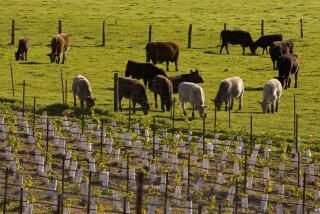Gov. Brown signs bills to promote ‘farm to fork’ in California
Gov. Jerry Brown said Friday he has signed a group of bills aimed at promoting the “farm to fork” movement in California that seeks to bring fresh produce and other foods closer to consumers, including many not served by grocery stores.
Brown signed seven bills, including a measure that creates a state Office of Farm to Fork to promote food access and increase agricultural products available to schools and under-served communities. Assemblyman John Perez (D-Los Angeles) authored the bill, which puts the new office within the California Department of Food and Agriculture.
Perez said in the state Democrats’ weekly address recently that California was home to 81,000 farms and ranches, but there remained areas of the state where getting fresh fruits and vegetables is difficult.
“Farmers are at work in every county of this state, yet nearly 1 million of our residents live in areas known as food deserts,” Perez said during the address. “People who live in food deserts — mostly in cities, but in rural communities, too — have no ready access to fresh and affordable produce.”
As a result, he said, people in those areas “suffer from higher rates of obesity, diabetes, heart disease and cancer.”
The new office under AB 2413 will work with city councils and county supervisors to identify under-served areas for new farmer’s markets and other non-profit food delivery operations.
The governor also signed a measure making it easier for people who live in condominiums and apartments to grow their own fruits and vegetables.
The bill by Assemblyman Steve Bradford (D-Gardena) requires landlords for one- or two-unit rental properties to permit tenants to grow food for their own use in portable containers in private outdoor backyards as long as the plants are maintained.
The measure also declares void and unenforceable any prohibitions on using backyards in condominium developments for personal gardens.
“Landlord-tenant leases and [home owner association] contracts often don’t allow the cultivation of food on residential property,” Bradford wrote to fellow lawmakers for his AB 2561. “This bill seeks to remove legal barriers and make growing food accessible to all Californians.”
More to Read
Start your day right
Sign up for Essential California for news, features and recommendations from the L.A. Times and beyond in your inbox six days a week.
You may occasionally receive promotional content from the Los Angeles Times.







